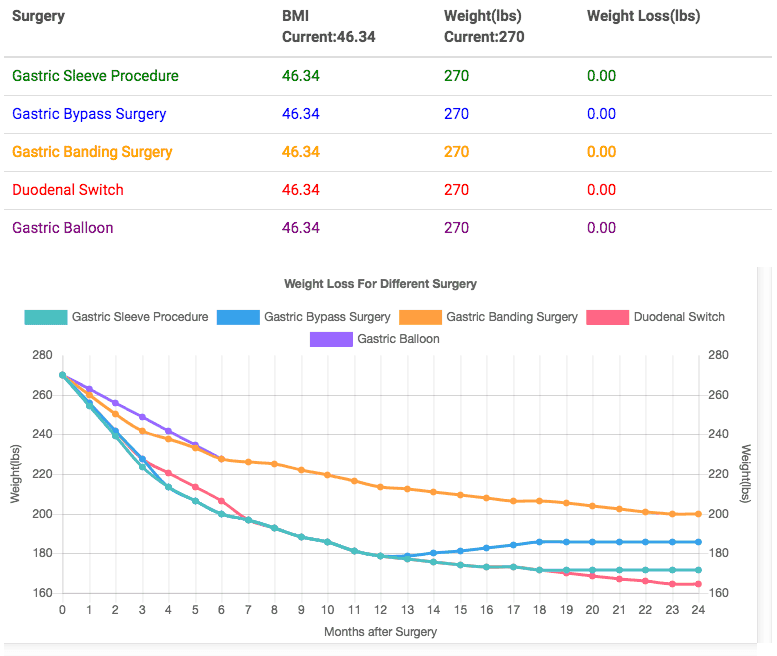


One of the most important issues for a lifetime success after your weight loss surgery is personal commitment to follow your surgeon’s guidelines for diet, lifestyle change and daily physical activities. Weight-loss surgery should not be considered a magical solution itself. There are some mental health conditions that may contribute to gain weight and also make it more difficult to maintain the health benefits of weight loss surgery.

Before making a final decision about the surgery, you and your surgeon should be sure for your personal consciousness and your ability to involve in the weight-loss process in long-term. People whose BMI calculation result is in the red part of the BMI chart are advised to have gastric sleeve surgery to lose weight. More likely you will have also to review your physical activities and find your own way to a healthier and happier you! These changes may lead you to altered and new feelings and sensations, new behaviours, probably to some relationship change. After the weight loss surgery you will face dietary restrictions, you will have to change permanently your eating and dietary habits. If you consider the weight-loss surgery, you should understand the relationship between physical activity and lifelong management of obesity. Physical activity is definitely related to improved health and higher energy levels, while physical inactivity might be related to the development of obesity. Many policies only cover weight loss surgery for patients with: A BMI over 40. Paradoxically, patients with a BMI of 30-35 have the best weight loss outcomes usually achieving over 90 EWL (See our results). Dietary habits, lifestyle and your previous weight loss attempts. Typically we use reverse BMI calculators to find out the lowest weight to which a patient can get during their supervised diet and still qualify for insurance coverage.General health condition, previous surgeries, diseases, medications, family medical history will help physicians prevent risks and choose the most effective and safe type of weight-loss surgery for you. Issues that will be assessed by our expert bariatric team to make a final decision whether the weight-loss surgery is safe and appropriate tool for you, will include your – Our BMI calculator will let you easily calculate your BMI (Body Mass Index). BMI is over 35, and you have additional health disorders related to obesity.BMI is over 33 and you suffer from diabetes type II.
#Bmi calculator for gastric sleeve full#
International classification of adult weight categories:īody Mass Index criteria for weight-loss surgery: Body Mass Index or BMI for gastric sleeve is your body weight (measured in kilograms) divided by the square of your full height (measured in meters). The Body Mass Index as an indicator of the obesity of the human body was initially developed by the Belgian statistician Adolphe Quetelet in 1850ties and is expressed as the person’s weight divided by person’s height square. Use the calculator below to find out your BMI and then continue your journey.Our expert bariatric team will carefully assess your eligibility for the operation from your BMI, your medical history and your personal commitment to dietary and lifestyle change. The most common bariatric surgeries are gastric sleeve, gastric bypass, and. This service is provided by our dietitian and health and wellness coach/personal trainer. BMI calculators and tables may be used by everyone and the tables or charts available on the Internet are clear enough to categorize oneself, however, doctors also make great use of BMI while assessing the health condition of adults as well as young patients. If you don’t qualify for bariatric surgery, we can look at alternative options to help you on your weight loss journey, including our Healthy Eating and Living Programme (HELP). Weight loss surgery is not always suitable for everyone. We will also review your medical and surgical history to make sure surgery is the right choice for you. When you have your initial consultations with our team, we’ll discuss your journey to date, your motivations and your goals. If your BMI is 30 or greater, you may be a good candidate for weight loss surgery.Įven though your BMI is a good physical indicator that you’re ready to begin your journey, it isn’t the only factor we consider. One of the ways we determine if you qualify for bariatric surgery is by calculating your body mass index ( BMI).


 0 kommentar(er)
0 kommentar(er)
